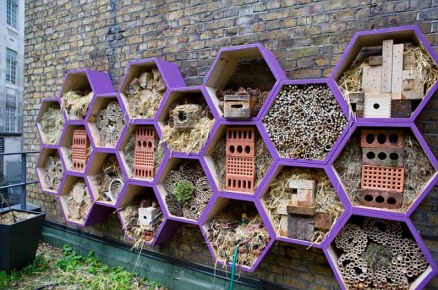Bee hotels may act as population sinks for native bees, creating an increase in parasites, predators and diseases, according to a study by Canadian biologists.
Scott MacIvor and Dr Laurence Packer , from York University, set up 600 bee hotels over three years in a variety of locations in Toronto. These included urban green space, community gardens, residential gardens, city parks and building rooftops.
They wanted to investigate if the hotels – also known as nest boxes or trap nests – really had a beneficial effect for native bees.
Their findings are published in Plos One , and include a consumer warning against “bee-washing” claims – which they describe as the pollinator equivalent of “green-washing” – for commercially available bee hotels.
During their three-year study, they found native wasps were “significantly more abundant” in the hotels than either native or introduced bees, and occupied around three-quarters of all bee hotels each year.
The researchers also found that native bees using the hotels were attacked by parasites more frequently than introduced bees, and introduced wasp s “were the only group to significantly increase in relative abundance from year to year.
“These results highlight a need for increased study of bee hotels and their associated impact upon bee biodiversity and pollination in the urban setting,” the study says.
Bee hotels have been used for ecological research, but are now are being promoted as way to provide habitat for pollinators in gardens and urban green spaces.
They’ve become popular in Australia, with several city and rural councils encouraging residents to “help re-populate our native bee numbers” by making a bee hotel from old wooden fruit crates filled with timber offcuts, bamboo, garden stakes, twigs and dried plant stems. Many schools have also introduced bee hotels as easy DIY sustainability projects for school gardens.
But the Canadian researchers suggest the design of bee hotels is critical. Poorly designed structure can encourage “unnaturally high nest densities”, exposing bees to parasites and disease.
“Although there has been little discussion of parasite loads obtained with different bee hotel designs, in all cases where nesting sites and nesting bees are aggregated, the chance of parasites finding and attacking nests is increased,” the study says.
And here’s where the “bee-washing” warning comes in. The study says bee hotels can be useful “for ecological and behavioural studies, outreach in citizen science and pollinator education campaigns” but claims by commerical retailers selling ready-made bee hotels for suburban gardens should be treated with common sense and caution.
“Bee hotels are usually made from bundled plant stems, paper-based tubes, or holes drilled in wood or moulded in plastic – in all cases they artificially aggregate nesting sites above densities naturally available for cavity-nesting bees,” the study says.
“Some designs are simply holes drilled, or moulded, into solid plastic blocks. It seems highly improbable that these designs will provide the same moisture balance as occurs in nature and increased moisture retention likely leads to increased brood mortality due to mould.”


This is a really interesting report on a very complex subject. At least residential gardeners who have put out bee boxes in Canada can be comforted if they have been hoping to help the native bees. Amelia
LikeLike